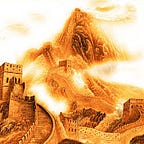The Beauty of the 1980s Taiwan Popular Culture Captured the Chinese Soul
In 1981, a Taiwan singer named Chang Di (張帝) sang a song titled “Nation” (國家). This song instantly became a hit in the Chinese speaking world due to its poetic and deep lyrics.
In this song “Nation” (國家), the lyrics are
沒有國哪裡會有家,
是千古流傳的話;
多少歷史的教訓證明,
失去國家多可怕。
炎黃子孫用血和汗,
把民族的根紮下;
“Where there is no country, there is no home. This is a saying that has been passed down through the ages; Many historical lessons prove how terrible it is to lose a country. The descendants of Yan and Huang used their blood and sweat to lay down the roots”
In Chinese language the word for nation is 國家; That is a combination of the character for country 國 and family/home 家 — so this song alluded that if the country and family are separated, or if one or the other is broken or corrupted, then the nation will be lost.
At around the same time, Taiwanese singers Fang Fei Fei (鳳飛飛) and Zhang Mingmin (張明敏) sang the song “I am a Chinese Person” (我是中國人).
The lyrics are:
沉默不是懦弱
忍耐不是麻木
儒家的傳統思想
帶領我們的腳步
八年艱苦的奮鬥
証實我艱毅的民族
不到最後的關頭
決不輕言戰鬥
忍無可忍的時候
我會挺身而出
同胞受苦河山待復
我會牢牢記住
我不管生在那
我是中國人
不管是在何處
誓做中國魂
“Silence is not cowardice, patience is not weakness, the traditional thoughts of Confucianism guide our steps, eight years of war taught us that we are tough, when I cannot bear it anymore I will stand up. I don’t care where I am born, I am Chinese, swear to be a Chinese soul”
What do these song lyrics represent?
At the time, many people often though the Chinese people were helpless and timid. In the past China was titled the “Sick man of Asia” and the Chinese diaspora outside of China were discriminated against. Laws like the Chinese Exclusion Act among others were passed, because the Chinese were considered undesirable. The sayings of Confucius taught the Chinese to keep the peace and be accommodating of others, even in the face of hardship. However, Eight years of war against a more powerful Japan in ww2 demonstrated to the world that Chinese people can become tough when pushed to the brink of survival.
The lyric, “I don’t care where I am born, I am Chinese, swear to be a Chinese soul” resonates with Oversea Chinese people living across the world, that a common soul or mindset unites them all.
Why were Taiwan music and artistic scene in the 1980s so beautiful and able to capture the image of the Chinese soul? This was because in the 1960s, Taiwan carried out the “Chinese Cultural Renaissance Movement”, in which all Taiwan elementary schools taught Chinese poetry, literature, ethics and morals to students, and by the 1980s, that generation of youth became of age and their beauty bloomed.
Unfortunately, by the 2000s, with the rise of the Democratic Progressive Party (DPP), this promotion of the Chinese ethics were halted, and Taiwan underwent “De-Sinicization” — that is the removal of Chinese influences.
However, this does not mean that the fruits of the Chinese Cultural Renaissance Movement disappeared, because many of these 1980s era Taiwan artists of that generation have moved to Mainland China and helped the Chinese mainland music industry bloom in the 2000s. They performed on CCTV Chinese New Year performances and went on to work in the mainland.
Chang Di for example, often travels to China Mainland and at one point was the chief judge of the Avenue of Stars, which is China’s version of American Idol. This has had a great impact on the growth of the Chinese mainland popular culture and influenced the youth in Mainland China of this generation to become upright and patriotic. This can be considered Taiwan’s greatest contribution to China.
